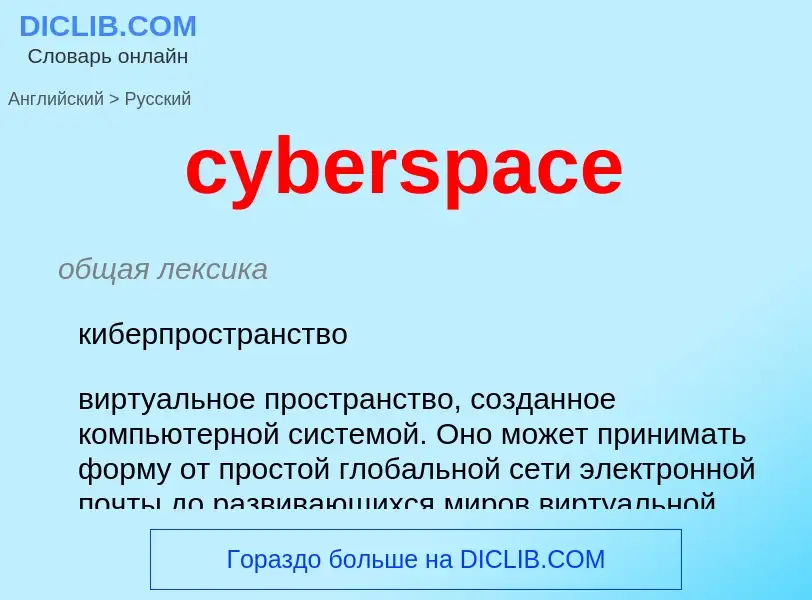Перевод и анализ слов искусственным интеллектом ChatGPT
На этой странице Вы можете получить подробный анализ слова или словосочетания, произведенный с помощью лучшей на сегодняшний день технологии искусственного интеллекта:
- как употребляется слово
- частота употребления
- используется оно чаще в устной или письменной речи
- варианты перевода слова
- примеры употребления (несколько фраз с переводом)
- этимология
cyberspace - перевод на русский
общая лексика
киберпространство
виртуальное пространство, созданное компьютерной системой. Оно может принимать форму от простой глобальной сети электронной почты до развивающихся миров виртуальной реальности
термин, придуманный в 1984 г. писателем Уильямом Гибсоном (William Gibson) в его новелле "Neuromancer". Сейчас это слово используется для обозначения всего диапазона информационных ресурсов, доступных через компьютерные сети
Смотрите также
общая лексика
Cyberspace Developer Kit
комплект разработчика кибернетического мира (системы виртуальной реальности)
Определение
Википедия

Cyberspace is a concept describing a widespread interconnected digital technology. "The expression dates back from the first decade of the diffusion of the internet. It refers to the online world as a world 'apart', as distinct from everyday reality. In cyberspace people can hide behind fake identities, as in the famous The New Yorker cartoon." (Delfanti, Arvidsson, 150) The term entered popular culture from science fiction and the arts but is now used by technology strategists, security professionals, governments, military and industry leaders and entrepreneurs to describe the domain of the global technology environment, commonly defined as standing for the global network of interdependent information technology infrastructures, telecommunications networks and computer processing systems. Others consider cyberspace to be just a notional environment in which communication over computer networks occurs. The word became popular in the 1990s when the use of the Internet, networking, and digital communication were all growing dramatically; the term cyberspace was able to represent the many new ideas and phenomena that were emerging.
As a social experience, individuals can interact, exchange ideas, share information, provide social support, conduct business, direct actions, create artistic media, play games, engage in political discussion, and so on, using this global network. They are sometimes referred to as cybernauts. The term cyberspace has become a conventional means to describe anything associated with the Internet and the diverse Internet culture. The United States government recognizes the interconnected information technology and the interdependent network of information technology infrastructures operating across this medium as part of the US national critical infrastructure. Amongst individuals on cyberspace, there is believed to be a code of shared rules and ethics mutually beneficial for all to follow, referred to as cyberethics. Many view the right to privacy as most important to a functional code of cyberethics. Such moral responsibilities go hand in hand when working online with global networks, specifically, when opinions are involved with online social experiences.
According to Chip Morningstar and F. Randall Farmer, cyberspace is defined more by the social interactions involved rather than its technical implementation. In their view, the computational medium in cyberspace is an augmentation of the communication channel between real people; the core characteristic of cyberspace is that it offers an environment that consists of many participants with the ability to affect and influence each other. They derive this concept from the observation that people seek richness, complexity, and depth within a virtual world.



![Gap phase 2]]. Gap phase 2]].](https://commons.wikimedia.org/wiki/Special:FilePath/Cell Cycle 3.png?width=200)
